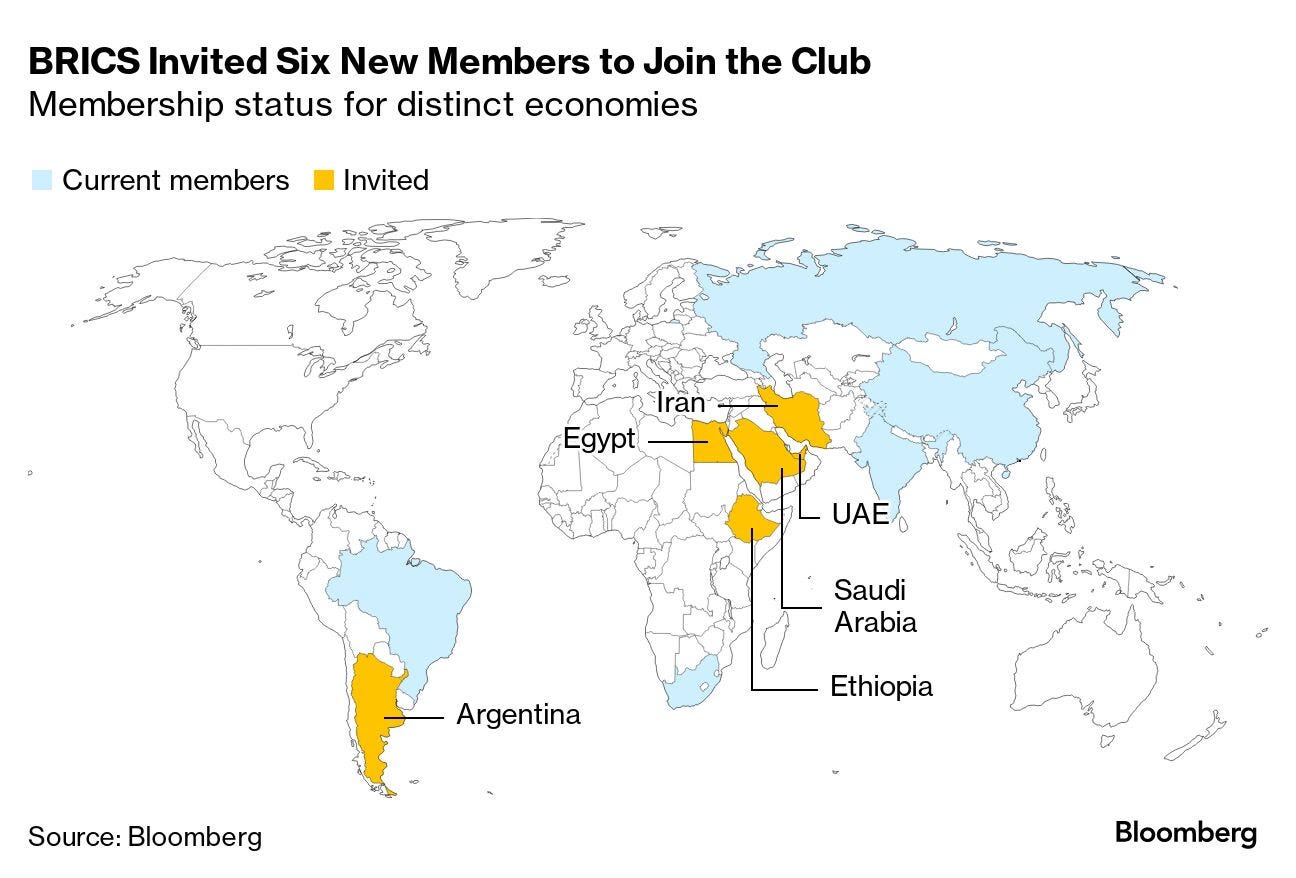🔅 Congo's Dark Secret in the Atomic Bomb & The Power of the Added 6 BRICS
Plus, Why Niger's Coup Sparked International Reactions & Nigerian President Bola Tinubu Tackles Emirates' Woes
Photo of the day: Cape Verde

Markets — Year to Date:
🟢 Nigerian SE: 65,558.91 (+27.92%)
🟢 Johannesburg SE: 73,836.01 (+1.08%)
🟢 Ghana SE: 3,069.32 (+25.59%)
🔴 Nairobi SE: 99.38 (-22.04%)
🟢 US S&P 500: 4,405.71 (+15.21%)
🔴 Shanghai Composite: 3,064.07 (-1.68%)
*Data accurate as of the close of markets across the continent
Brief & Bright: Africa's Top Five Highlights
Africa's Borrowed Hand in the First Atomic Bomb
It's one of the world's most infamous moments: the dropping of the first atomic bomb on Hiroshima in 1945. But here's a fact you probably didn't learn in history class: Africa had a hand in the whole thing. Yep, the uranium used to make the bomb and subsequent atomic weapons was sourced from the Democratic Republic of the Congo (DRC). And it's no wonder that Christopher Nolan's biopic about J. Robert Oppenheimer, the head of the Manhattan Project, didn't mention this—it was a secret.
The Congolese labourers at the Shinkolobwe mine were paid low wages and forced to work under secret contracts. The US kept up the ruse by making it look like the uranium was sourced from Canada, while the DRC's ores yielded 65 per cent uranium. When the DRC gained independence from Belgium in 1960, the US had to ensure that whoever was ruling over the DRC was under their control—enter Mobutu Sese Seko, who remained in power from 1965 to 1997. Mobutu was accused of corruption, and his rule plunged the DRC into deeper poverty, with 62 per cent of the population living on less than $2.15 a day. The economic and health effects of the ore radiation are still felt to this day. Who knew that one bomb could have such a long-reaching ripple effect?
Is Nigerian President Bola Tinubu Losing His Touch?
President Bola Tinubu has done two big things since taking office: taking away fuel subsidies and allowing the currency to float freely. Both of these moves make sense for the long-term health of the Nigerian economy—but it’s come at a cost to the average citizen. Gas prices have more than doubled and the plunging naira has caused food and other goods prices to skyrocket. The government has been trying to soften the blow by giving out subsidized grain and delaying taxes, but investors aren’t too happy about Tinubu’s wavering. And now, with inflation reaching a new 18-year-high of 24.1%, the Nigerian president is caught in a tough spot. He's either going to anger his citizens or disappoint the markets.
The World's Reactions to Niger's Coup: A Reminder of How Important the Country Is
If you’re wondering why the coup in Niger has caused such an international stir, the answer is simple: Niger is important. It’s the last democracy in the Sahel region, it’s a key ally in Europe’s fight against migration, it’s the linchpin of the global fight against jihadism, and it is a key supplier of uranium (that powers nuclear reactors) to the Wst. The US and the EU have already invested billions of dollars in the country’s military and development, and now the regional bloc Ecowas is ready to restore democracy “by all means available.”
Tinubu Takes on Nigeria-UAE Woes

Bola Tinubu has a plan to sort out the Nigerian-UAE mess. The Nigerian President is calling for a family meeting with the UAE’s ambassador to Nigeria, Salem Saeed Al-Shamsi, to get to the bottom of the issue. The dispute began last year when Dubai’s Emirates airline suspended flights due to an inability to repatriate funds from Nigeria. (Nigeria has withheld at least $743 million in revenue earned by international carriers operating in the country.) Since then, the UAE has stopped issuing visas to Nigerians. Tinubu has promised to “personally intervene” in the dispute, which is likely related to Nigeria’s dollar shortages, making it difficult for some foreign airlines to get their money out of the country.
BRICS: The Power of The Added Six
It’s a brave new world in the BRICS bloc: The five emerging market powers—Brazil, Russia, India, China and South Africa—unanimously decided to admit six new members at their annual summit this week. The “BRICS+6” now includes Saudi Arabia, Iran, Egypt, the United Arab Emirates, Argentina, and Ethiopia, and they’re bringing their own specialities to the table. These nations have significant global control over the supply of key commodities like oil and metals, and they have big plans for gaining more sway over global political institutions, such as the UN, the IMF and the World Bank. They're also setting out to increase trade using their own currencies, which is likely to impact the mighty dollar's hegemony. With their share of global output already eclipsing the Group of Seven nations, it’s going to get harder to ignore the BRICS (+6). The Gulf nations, in particular, are taking advantage of the opportunity to diversify their economic and political relationships without abandoning their ties to the US. Let’s see what these six nations can do for the BRICS bloc.
Food for Thought
“When the right-hand washes the left-hand and the left-hand washes the right-hand, both hands become clean.”
— Kenyan Proverb.
Are we hitting the mark?
Enjoying Baobab's updates? Spread the joy and share us with friends and colleagues — we'd be thrilled to have them join!
Feedback or thoughts? Just hit reply. We're all ears!






